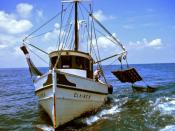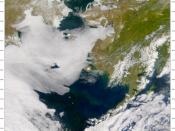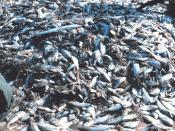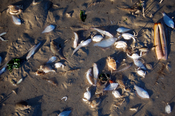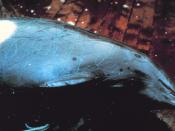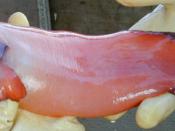Mike and Sally's neighbor, Bob, has decided to recreate his house from the bottom up. Therefore, Bob immediately has a bulldozer arrive at his house to destroy it completely so that he may build his new dream house. Once the bulldozer has wrecked Bob's living quarters completely, it does not seem to stop. The bulldozer keeps demolishing everything else in its path, including Mike and Sally's house. Sadly, Mike and Sally's pet hamsters were in the house along with many other valuable items that were completely flattened into the many mounds of ruble. Of course, this is not a true story, but it is actually a hyperbole of the marine-life dilemmas going on presently in oceans everywhere around the world. The story of Mike and Sally's house being destroyed represents the millions of non-target sea creatures and their habitats that are accidentally caught and destroyed by commercial fishing. This growing problem, known as "bycatch", is not only killing millions of sea creatures, but also it is turning the marine life into an unbalanced habitat.
Bycatch is only one of many problems caused by today's commercial fishing. Present day commercial fishing needs to be regulated more strictly because of its excessive bycatch and damage to the seabeds, poor fishery management systems, and over fishing, which unfortunately encourages fish farming.
Commercial fishing needs to be regulated on a stricter basis because of the excessive amounts of bycatch and the damage is does to seabeds. Peter Singer and Jim Mason explain in their book, The Way we Eat: Why our Food Choices Matter, that a quarter of fish caught by commercial fisherman around the world is bycatch (Mason and Singer, 112). Singer and Mason also add that today's boats are bigger and nets reach deeper, therefore they catch greater numbers of fish, but these boats also create greater damages by scooping up millions of unwanted sea life and damaging the sea beds with their gears (Mason and Singer 112). Because of new technology, commercial fishers are catching a lot more fish, but are also inflicting a lot more damage upon marine life. Not only are a quarter of the fish caught unwanted, but also they are thrown back into the water dying or dead. Anchorage Daily News online article called "Bycatch cap for Bering Sea fishery weighed: KING SALMON: Heated debate expected versus Pollock industry," explains that every year billions of pounds of Bering Sea Pollock are caught to make products such as imitation crab and fish sticks (Wesley). The problem arising is that the Pollock commercial fishers are actually catching and killing many of the very precious fish called King Salmon while in pursuit of the Pollock (Wesley). Because of bycatch, many of the most valuable King Salmon are going to waste in quest to catch the nation's biggest commercial sea creature, Pollock. Once again, commercial fishers are catching non-target fish that completely go to waste and in this case, the bycatch is very expensive. Seabeds provide our universe with much meaning. Benthic Fauna is referred to as the tiny creatures that live on or within the seabed. Benthic Fauna is very important to scientist because it shows how healthy our environment truly is and can detect bycatch and abuse in and around the area. According to Michael Kaiser, "Conflict management in the form of gear-restriction measures is beneficial to conserving habitats and benthic fauna sensitive to bottom-fishing disturbance." Commercial fishing needs to be regulated more strict because it also effects the economy. One might think that is inhumane to say however, when thinking; a big margin of tourism to Mexico is the attraction of fishing "big game". Pete Thomas wrote an article in the Los Angeles Times saying, "Outposts has learned that Mexico has amended its controversial shark-fishing regulation (NOM-029) to allow a 30% rate of incidental bycatch to commercial longliners holding shark permits." This means an increasingly diminished fishery for the big game such as Marlin and Dorado, two of the main fish that attract fisherman for tourism in Mexico. Also, fishing brings in a large income for numerous individuals in Alaska. According to Jeanette Lee, "The trend is deeply troubling for people living along the great rivers of western Alaska, including the Yukon. Salmon are a staple food and in some cases a primary source of cash for dozens of villages from the mouth of the 2,000-mile river to its headwaters in Canada. Wild Alaska kings also make up a small, but highly valuable segment of the worldwide fish market." This means many will face harsh times in this ever so rough economy that the country has fallen to.
Another reason commercial fishing needs to be more strictly regulated is because of the poor fishery management systems. According to Singer and Mason, aninvestigation was done on a company that produces breaded fish fillets called, Gorton's (Mason and Singer 115). Upon investigation, Singer and Mason found that Gorton's packaging did not bear the Marine Stewardship Council seal of approval (Mason and Singer 115). This seal indicates that the fish is no longer being caught in the Gulf of Alaska, where commercial fishing is now limited on this certain creature because of the excessive bycatch (Mason and Singer115). Because Gorton's breaded fish fillets did not have this certain seal, it is apparent that they got around the system of the poor fishery management rules and still got the fish that they needed to make their profit. If a large fish company, such as Gorton's, is willing to risk breaking the commercial fishing rules, then that must say something about the rules right there. The rules do not seem to be threatening. A Morning Edition online article called "Pacific Salmon Fishery Faces Limits, Ban" explains that a federal panel will meet in the upcoming month of June to regulate whether or not to limit or to totally ban salmon fishing off the coast of Washington, Oregon and California (Montagne). The commercial fishermen that will be heard to testify are already promoting zero fishery (Montagne). Because the fishery management took so long to regulate salmon fishing off the west coast of the United States, fisherman are opposed to commercial fishing for salmon because they would not be able to make a living off the salmon and they are also hoping that salmon may be able to build its fish stock numbers back up. Otto Pohl of the New York Times wrote an article a few years back stating, "Enforcement is difficult in any event, because most bycatch is dumped at sea by fishermen who are rarely motivated to keep precise records." It is inevitable that rules need to be enforced in order to save the ocean creatures. "They said that depleted populations of many species would be unlikely to recover unless more was done to toughen restrictions on fishing boats that currently catch and throw back many species other than those they intend to bring to market (Cushman Jr.)." Fishery management needs to be able to see a shortage of fish ahead of time and react before it is not too late.
A third reason that commercial fishing needs to be regulated more strictly is because of the over fishing that is taking place. The Over fishing online website definesover fishing as, "catching too many fish; fishing so much that the fish cannot sustain their population" ("Overfishing Basics"). Singer and Mason explain that when Newfoundland was first discovered, the cod fish ran so thick throughout the banks that one could reach over the side of a boat with a net and catch several cod (Mason and Singer113). With today's giant ships that have nets with a thousand foot wide mouths, overfishing has become a problem and the cod are becoming extinct on the banks of Newfoundland (Mason and Singer113). Because of many factors including, many ships, bigger ships, few boundaries and a perfect enviornment for cod, overfishing has become a huge problem. The fish are becoming fewer and fewer until there is not enough fish to breedand replenish the population. An Irish Times online article called "Over fishing: scientists' warnings ignored," explains that the cod and orange species of fish that are found in Irish waters are becoming extinct for commercial fishers (Smyth). Scientific advice about managing the stocks of fish has been completely ignored and now the cod and orange fish do not even exist in amounts to be fished commercially (Smyth). It would not be shocking to state that over fishing might be an effect of the growth of fisherman. In an article by Milazzo, he states, "The reason why over fishing can easily happen is that in most fisheries just about anyone has the right to have a go, and plenty have exercised that right. In past decades, the number of fishermen, as well as fish farmers, has been growing across the developing world." According to Richard Grainger of the FAO, the total worldwide has more than doubled in the past 25 years. Apparently, over fishing is growing rampantly into a larger and larger problem even when scientists give warnings. Over fishing is not only damaging the food supplies but marine ecosystems as well.
Unfortunately, over fishing is a reality and because of it many have turned to an unfortunate alternate, fish faming. The "Fishing Hurts" online website describes fish farming as, "raising fish commercially in tanks or enclosures, usually for food" ("Fish Farms: Underwater Factories"). Singer and Mason explain three of the many problems with fish farming: the fish farming industry uses excessive amounts of fossil fuels, thewaters around the cages and the sea beds below become conaminated and polluted, many of the farmed salmon escaped from pens and breed with native salmon (Mason and Singer 124). Because the farmed salmon need sufficient areas to live and need to be fed with timed feeders, tons of non-renewable fossil fuels are used up (Mason and Singer 123). The second issuse is a concern to the ocean's marine life because the tremendous amount of feces and excess feed is discharged. These feces from the farmed slamon contain large amounts of nitrogen and many antibiotics and pesticides, that are used to aid the fish, are released into the ocean as well (Mason and Singer 124). The last issue that Mason and Singer adress is that when these farmed Salmon escape, they caninterbreed with native salmon and change their genetics while also infecting wild fish with diseases and parasites that the farmed fish are immune to (Mason 124). According to Marion Nestle's book What to Eat, farmed fish have a toxic chemical called polychlorinated biphenyls (PCBs), which is added to their meals and oils to help accelerate their growth and protein levels (Nestle 203). Many fish have PCBs but not at a harmful level. These farmed fish have a lot more of PCB because they are intended to grow faster so that they may be put on the market faster. This chemical is not meant to be digested, especially at the high level that the farmed fish have. This disturbing additional chemical may be the ultimate factor to ban farmed fishing once and for all. Sadly enough, Alaska is known as the last salmon stronghold in the world, and at this pace a stronghold can only be strong lone enough before being broken. There is a tremendously scary pace that has been set in the past few years with the number of accidental fish catches. Kim Murphy reports that,"the number of chinook caught accidentally in the massive nets has risen sharply in recent years, from 46,993 in 2003 to a high of 121,704 in 2007."Present day Commercial Fishing needs to be regulated more strictly because of its excessive bycatch and damage to the seabeds, poor fishery management systems, and over fishing, which encourages fish farming. Author Jim Mason says, "Seafood is a significant, and growing, part of the diet of most American families" (Mason and Singer111). And lets face it, the fish that is sitting in the freezers at the supermarkets may not be stocked in the near future and commercial fishing will be the one to blame. Unfortunately, Mike and Sally got their home crushed by the bulldozer, but it does not have to happen to the homes of the potential meals that swim throughout the oceans of the world.
Works CitedCushman Jr., John. "Cuts Sought in Wasteful Fish Kills." 13 January 1998. 9 May 2009 .
"Fish Farms: Underwater Factories." Fishing Hurts. 2009. PCTA. 6 May 2009.
Kaiser, Michel. 2000. 10 May 2009 .
Lee, Jeannette J. "Bering Sea Pollock fleet faces closure over salmon." 22 June 2008. 13 May 2009 .
Mason, Jim, and Singer Mason. The Way we Eat: Why our Food Choices Matter. Rodale,2006. Print. 111-124Milazzo, Matteo. 15 May 2009 .
Montagne, Renee. "Pacific Salmon Fishery Faces Limits, Ban." Morning Edition 1, Jan.
2009: Academic Search Premier. EBSCOhost. Rio Hondo College Library. Web. 6 May 2009. .
Murphy , Kim. "Factory boats face cap on accidental salmon catch." 7 April 2009. 10 May 2009 .
Nestle, Marion. What to Eat. New York: North Point Press, 2007. Print.
"Overfishing Basics." Overfishing - A Global Disaster. 2007. Pepijn Koster. 13 May 2009. . 203Pohl, Otto. "Challenge to Fishing: Keep the Wrong Species Out of Its Huge Nets." 29 July 2003. 14 May 2009 .
Smyth, Jamie. "Overfishing: scientists' warnings ignored." Irish Times 55/22/2007:EBSCOhost. Academic Search Premier. Rio Hondo College Library. Web. 6 May 2009. .
Thomas, Pete. "Bad news for anglers and game fish in Mexico ." September 16 2008. 6 May 2009 .
Wesley , Loy. "Bycatch cap for Bering Sea fishery weighed: KING SALMON: Heateddebate expected versus Pollock industry.." Anchorage Daily News 3/29/2009: EBSCOhost. Academic Search Premier. Rio Hondo College Library. 13 May 2009. .
